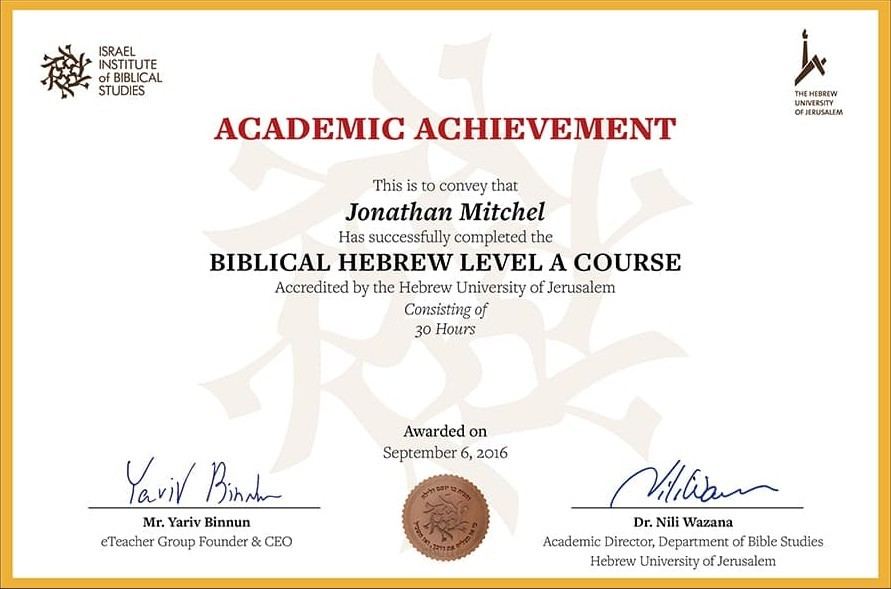 What are your reasons to learn Biblical Greek and Hebrew? Both languages have a venerable history behind them. In history, the Hebrew language (the Semitic language of the North Central or Northwestern region) was spoken in ancient times in Palestine. In fact, it is closely related to the Phoenician and Moabite languages and is often placed in the Canaanite sub-group by renowned scholars.
What are your reasons to learn Biblical Greek and Hebrew? Both languages have a venerable history behind them. In history, the Hebrew language (the Semitic language of the North Central or Northwestern region) was spoken in ancient times in Palestine. In fact, it is closely related to the Phoenician and Moabite languages and is often placed in the Canaanite sub-group by renowned scholars.
Although the Hebrew language lost its prominence and was replaced by the Western dialect of the Aramaic (at the beginning of the 3rd century), it still remained in use as a liturgical and literary language. The history could be divided into:
- Biblical or Classical Hebrew
- Mishnaic or Rabbinic Hebrew
- Medieval Hebrew
- Modern Hebrew
Biblical Greek (also known as Koine Greek or Hellenistic Greek) was derived from Attic, and it is a more recent dialect. Biblical Greek is pronounced more closely to modern Greek. This dialect arose within the armies of Alexander the Great and spread under the leadership of Macedon from the Ptolemaic kingdom of Egypt to the Seleucid Empire of Mesopotamia. It is the version of Greek found in the New Testament, and it is also called ‘common language.’
Where to Learn Biblical Greek and Biblical Hebrew?
If you are interested in learning Biblical Greek and Hebrew, the internet provides you with great opportunities. One of these is the Israel Institute of Biblical Studies. It is an institution rooted in Israel and Judaism. The institution aims to engage students in an academically challenging environment through an in-depth study of the Bible. It is recognized in Israel and the world as a renowned academy for the study of biblical culture, biblical languages and history.
Some of its experts include:
- Dr Ohad Cohen (Teaches Biblical Hebrew)
- Tamar Weyi (Teaches Modern Hebrew)
- Judith Green, M.A. (Teaches Biblical Greek)
The Institute offers courses in Biblical Languages, such as Biblical Hebrew, Biblical Greek, and Biblical Aramaic.
 The Biblical Hebrew Program consists of five courses made up of levels 1 to 5 in which the student is required to study, among other topics, the Hebrew alphabet or biblical syntax. They will become familiar with the reasons grounding past translation decisions over several ages. Thus they will be able to understand how these decisions have affected the sense of the initial Bible text.
The Biblical Hebrew Program consists of five courses made up of levels 1 to 5 in which the student is required to study, among other topics, the Hebrew alphabet or biblical syntax. They will become familiar with the reasons grounding past translation decisions over several ages. Thus they will be able to understand how these decisions have affected the sense of the initial Bible text.
The Biblical Greek Course has two levels in which the student will start by mastering Greek letters and grammar and then learn how translations over several centuries have modified a great part of the message contained in the texts of the New Testament.
Do You Really Need to Learn Biblical Greek and Hebrew?
Consider the statement made by William D. Mounce, in his book Greek for the Rest of Us, that it was interesting to read Caesar’s works in latin, but it was life-changing to read the Bible in Greek. It is quite understandable that you might wonder why you should learn biblical Greek and Hebrew. However, it would particularly interest you to know the reasons behind this suggestion as contained in this article.
What Are the Historical Reasons?
These reasons are essentially tied to the historical roots of these languages. For instance, the Greek language has a long and rich history, which stretches more than three thousand years. Various modifications to the Greek and Hebrew languages as they spread from one region of the world to the other led to the development of the ‘common Greek’ otherwise known as the ‘koine Greek’ used mainly for non-specialised day-to-day interactions among laymen and traders.

Particularly Important Non-Historical Reasons
- Mastery of biblical exegesis: It remains a fact that, the accurate interpretation of the text contained in the Bible and other literature originally written in the Greek language is highly dependent on a firm grasp of the original forms of the language in which they were written. In the translation of Greek and Hebrew text to English and other languages widely read all over the world, a lot of the original Greek and Hebrew which contributes to the meaning and intention of the text is often severed (to reduce bulkiness or redundancy in the translated text) as there might not be an equivalent in the language being translated to
- Understanding Biblical Hebrew and Biblical Greek opens up interpretive options: A peculiar nature of the Hebrew and Greek language is the host of meaning which could be attached to each word. Thus, learning the biblical or classical Hebrew and the Biblical Greek forms of these languages would arm you with enough tools to correctly interpret based on context.
- Improved hermeneutics: Be rest assured that your ability to methodically and scientifically interpret biblical texts and other related texts accurately would soar upon learning and understanding Biblical Greek and Biblical Hebrew.
- Emphasis within Greek and Hebrew text: Usually, the author of the text written in Greek or Hebrew encodes his / her ideas using figures of speech such as: assonance, alliteration, poetic structure, marked / unmarked word etc. To effectively and accurately understand the encoded meaning, the reader must be well grounded in the original language of the text rather than the meaning contained in interpreted versions (which waters down the author’s emphasis and intended meaning).
- It is an important antidote to hermeneutical arrogance: Since a knowledge of Biblical Greek and Biblical Hebrew improves hermeneutic potential and exegetical competence, wrong interpretations of texts translated from Greek and Hebrew would be significantly reduced.
Benefits Attached to Learning These Languages
The following, amongst many others are some benefits of learning Biblical Greek and Hebrew:
- Understanding one more language: An excellent way of exercising the brain is by learning a language. The complexity associated with learning the basics of such language tasks and puts the brain to work, thereby ensuring proper, long-term functioning of the cognitive areas of the brain. Therefore, a decision to learn biblical Greek and Biblical Hebrew would be very good exercise for the mind and brain.
- Verbal competence: By learning the classical forms of the Greek and Hebrew languages, it would be much easier to interact with the concepts and ideas shared in the original texts and manuscripts of the books you love to read (e.g The bible and other books traditionally written in these languages). Also, your competence level would soar considerably!
- Meaningful traditional interpretations: Because spoken and written languages are often in relation with cultural undertone, a closer and more accurate ability to interpret texts and spoken language in the context of interplaying cultural values would become much easier.
- Understanding culture: One of the packages that come with learning a new language includes getting an understanding of the culture and cultural values associated with the language learnt.
- Pitfalls are avoided: A lot of errors are usually associated with learning from translated text, as there may not be an exact equivalent for the word translated from one language to the other. To avoid this pitfall into which virtually everyone falls into, especially when it comes to reading and interpreting the Bible and other books whose origin (s) is deeply rooted in Greek and Hebrew, the way to go about mastering the subject matter is by learning Biblical Greek and Biblical Hebrew.
 What Does One Need to Start Learning?
What Does One Need to Start Learning?
The very first thing that is needed is to get interested in learning either or both of the Biblical Greek and Biblical Hebrew. Next to this, one must have a deep understanding of the reason (s) why you would like to learn either of these languages. Is it to be able to read the Old Testament in the original Hebrew or to be able to read the New Testament in the original, common, classical Greek in which it was written? Or to strengthen your understanding during the study of the Bible and other related texts.
This phase is very important because it would be your landmark, ensuring you do not give up when ‘difficult’ times come up during the course of learning either or both language. Learners of these languages who have recognized a deep understanding of the reason (s) why they need to learn Biblical Greek and Hebrew have higher chances of finishing the training session successfully and reaping the benefits associated, in comparison to those who are yet to recognize the main reason (s) behind their interest.
How Difficult Is It Learning These Languages?
Well, the difficulty level is quite different from those experienced by typical language learners. Particularly, three categories of issues experienced by learners in the course of learning these languages include:
1) ‘Words to be learned are different, and they need to be learned.’
2) At the start, they had a faint idea of the amount of effort needed to make progress in the learning process.
3) The type of grammar is quite different. However, it must be noted that the grammar is not complicated but consistent in its own terms; the terms might just seem to be different.
Basically, if one is an English speaker, learning Biblical Greek and Biblical Hebrew might pose a bit of challenge. This is because both of these languages are not closely related to English, thus, they require a radically different approach to learning and may not be easily cross-linked with what is already known by the speaker in the English language. The conventions are simply just different.
A particularly important recommendation for these identified problems is die-hard determination and tenacity to learn! It is recommended that one hour per day should be dedicated to learning ancient languages. After about 150 hours of determined and focused practice, it is expected that appreciable progress would have been made in learning these languages. However, some parts of the Old Testament are particularly difficult to learn, while others are known to be straight forward and easy to comprehend.
Textbooks and Private Tutors
Textbooks are very useful facilitators of the learning process. Summarily, instructional materials that would you give a step-by-step instruction on how to go through the stroke-by-stroke of Biblical Greek and Biblical Hebrew should be followed. You could also check Amazon or visit the publishers of books on Biblical Greek and Hebrew directly.
To enhance the learning process, private tutors could be engaged. However, before engaging the service of any private tutor (online or offline) be sure the tutor is vast and well-grounded in the language of interest and has necessary certifications to that effect.
Considered Learning Biblical Greek and Hebrew?
As stressed in the earlier parts of this text, making a decision to learn Biblical Greek and Hebrew is an important one. It has the potential of changing your life and the way you interpret and understand Greek and Hebrew writings. For Preachers and Pastors, a whole new wave of understanding would be instituted as the Old Testament comes to life in the ancient Hebrew language in which it was written, without any modifications, construed or hidden meaning associated with the translated text prevalent in our present age.
For the individual who is curious and willing to have a deepened understanding of the New Testament, learning the koine or common Greek would be of immense benefit. Both the Greek and Hebrew languages are of significant historical importance in the history of the world. Since the relegation of the use of these languages to the background after the introduction of the Western dialect of the Aramaic, the deep words of knowledge and wisdom stored in books written in those languages have been left untapped.
This is partly due to the unpopularity of the language itself, the difficulty it takes to learn the original forms of the language and wide availability of various translations from the original Greek and Hebrew language which give us a manageable idea of what is contained in the original languages (despite the fact that the ideas presented are just the tips of the iceberg!).
Before you delve into the learning process, it is quite important to define the reason why you chose to learn either or both of the languages. This (as mentioned before) would ensure that you are focused and determined in the face of challenges (which would surely come up) during the process of learning the language(s). Then, appropriate instructional materials should be consulted. Only trusted and certified private tutors (both online and offline) should be engaged in the teaching/learning process.